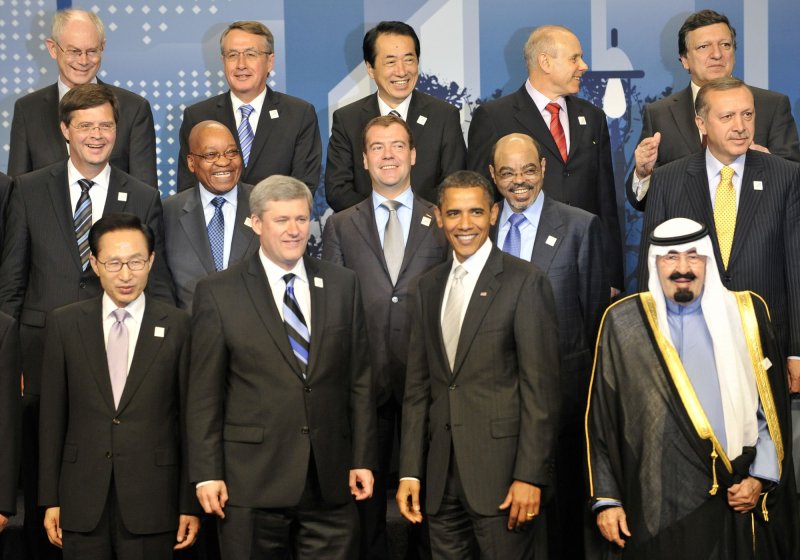The state leaders wave during the G20 Summit in Toronto, Ontario on June 27, 2010. UPI/Alex Volgin |
License Photo
SEOUL, Nov. 10 (UPI) -- U.S. President Obama, on the eve of the Group of 20 summit in Seoul, asked world leaders to avoid relying only on U.S. activity to address global economic ills.
In a letter to the G20 leaders Wednesday, Obama tried to calm tensions over currency that have shaken global economic relations without naming the two sources of the tension -- China's foreign-exchange interference and the Federal Reserve's recent decision to pump $600 billion into the U.S. economy, The New York Times reported.
"We all now recognize that the foundation for a strong and durable recovery will not materialize if American households stop saving and go back to spending based on borrowing," Obama said in the letter distributed shortly before he arrived in Seoul for the summit Thursday and Friday. "Yet no one country can achieve our joint objective of a strong, sustainable and balanced recovery on its own."
Obama's letter was distributed as U.S. Treasury Secretary Timothy Geithner warned in a Wall Street Journal commentary that a "two-track recovery will dominate the global economy for a long time to come" and require broader cooperation. Geithner wrote the Journal op-ed piece with Tharman Shanmugaratnam, the finance minister of Singapore, and Wayne Swan, Australia's treasurer.
Whether China and Germany, the two powerful surplus economies, would work to curb their reliance on exports, their high rates of savings and their relatively low consumption, remains to be seen, the Times said. Officials from both nations criticized the Fed's actions.
Obama's letter reaffirms goals his administration has been voicing for months without outlining specifics.
"A rebalancing of the sources of global demand, along with market determination of exchange rates that reverses significant undervaluation, are the best base for the shifts needed to bring about the vigorous and well-balanced recovery that we all want," he wrote. "When all nations do their part -- emerging no less than advanced, surplus no less than deficit -- we all benefit from higher growth."















